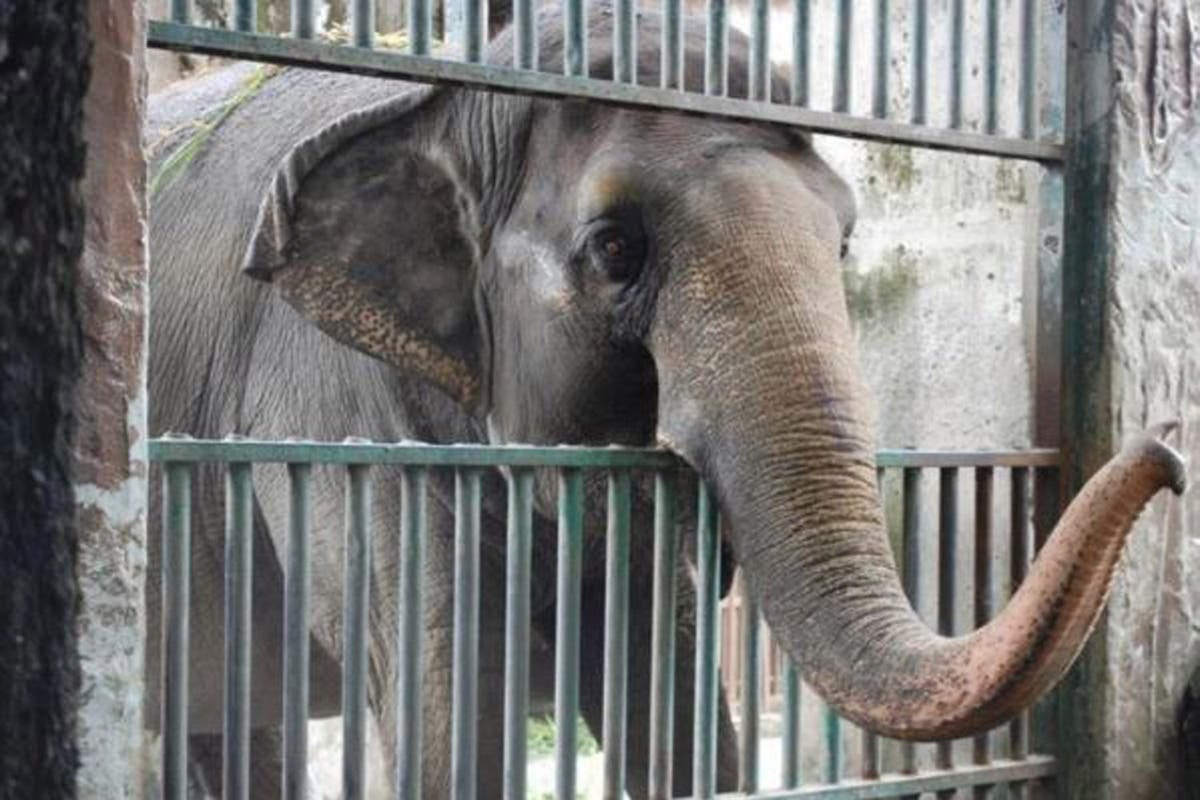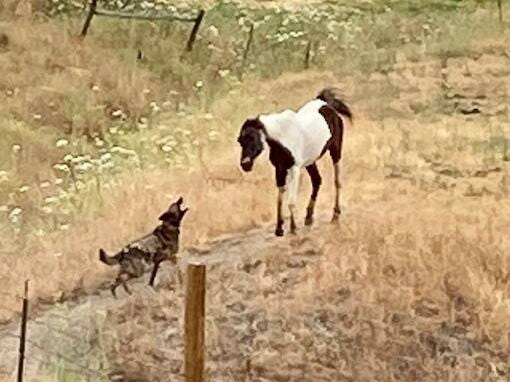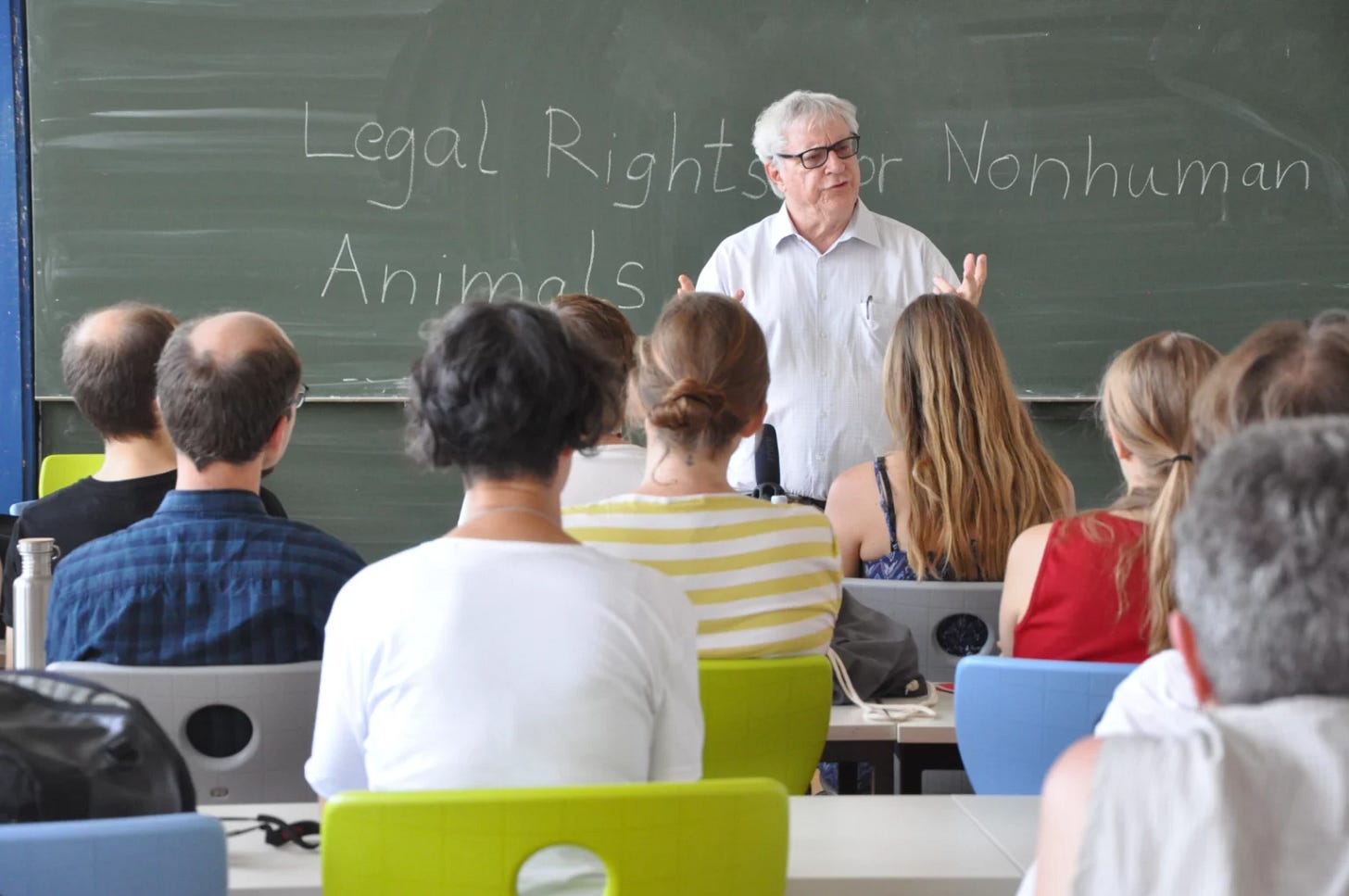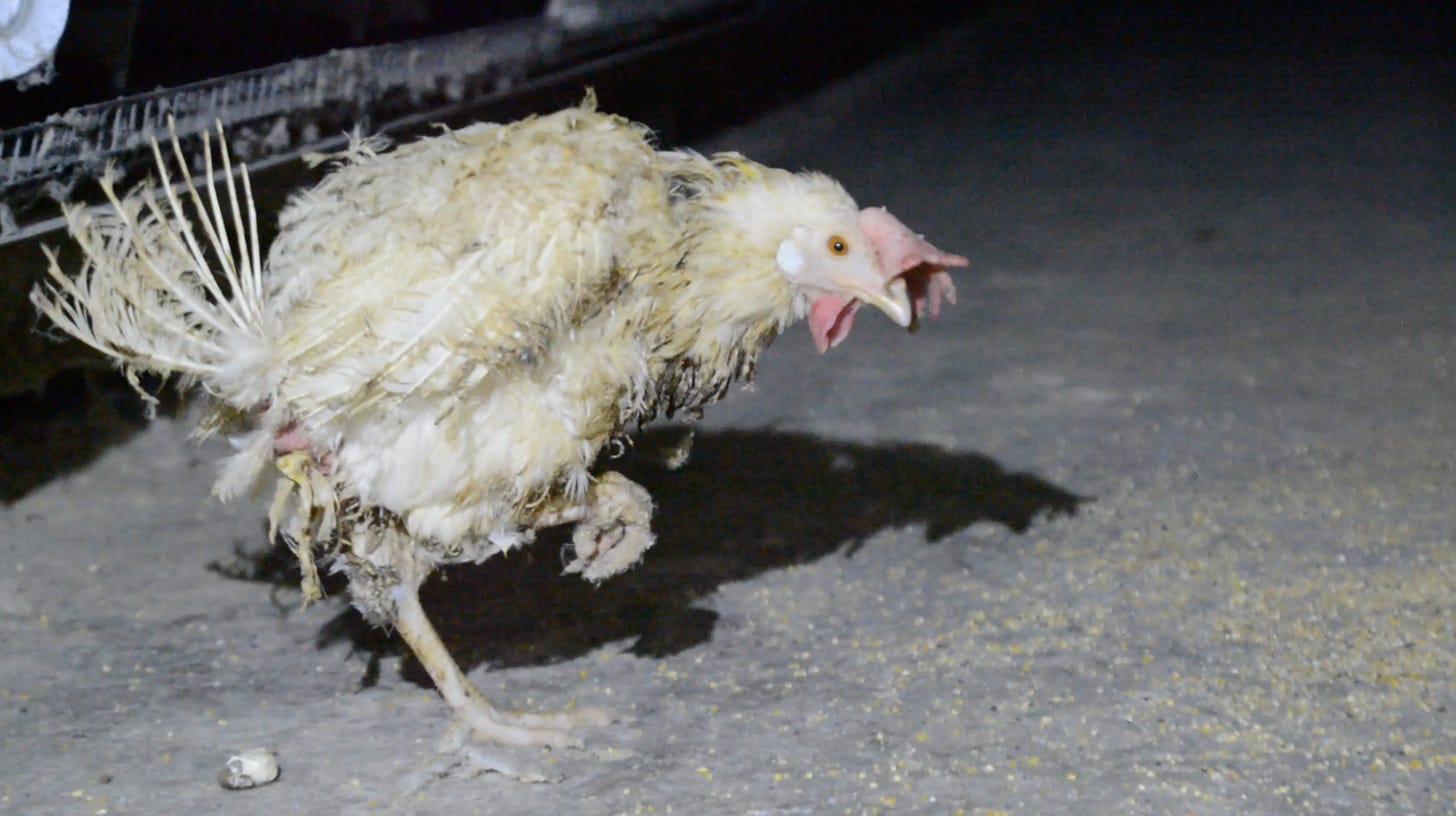Legal Personhood for Animals is More Important Than Ever
The failure of Sonoma authorities to protect a dying horse highlights the importance of providing legal standing to the powerless.
What’s up this week
The fight for animal “personhood” is among the most crucial battles that will unfold at the Sonoma Rescue Trial in just two weeks. The death of a horse in Sonoma County, who was starved and tortured for a year, demonstrates why legal personhood is so important. But it’s not just one horse, but all of us, who will benefit from expanding the concept of personhood. I explain why below.
Veganism isn’t growing. That’s the result of the most recent Gallup Poll on the question, which found that 4% of Americans identify as vegetarian and only 1% as vegan. This is, in fact, a decrease from the late 1990s, when 6% of Americans identified as vegetarian. This should not be a surprising result for anyone who reads this newsletter, as I’ve argued in the past that the vegan consumer movement has failed.
But the reason veganism is not growing is corruption, including a shocking 190:1 financial lobbying advantage for animal agriculture. That’s right: animal ag spends $190 in lobbying compared to $1 for other sources of protein. And that results in an even more shocking 800:1 financial advantage for animal agriculture in government subsidies, according a new study from Stanford University. If you’re wondering why McDonald’s is everywhere, this is why.
We’re two weeks from trial, and this Sunday’s Open Rescue Advocates meeting at 5 pm PT will be my last public meeting and gathering before trial. Priya and I will be telling the story of what happened in Sonoma County — and sharing how you can be a key part of this historic trial. We have some really creative ideas to share. I hope you can make it.
Ruby’s Story
When I first came across the idea of “animal personhood,” I thought it was a joke. Animals are great, I thought, but they’re not human beings. At best, the concept of animal personhood seemed like an abstraction for philosophers with too much time on their hands.
But what I’ve learned over the last two decades is that the fight for animal personhood is not just an intellectual debate; it’s a crucial, real-world battleground in the effort to save living beings from abuse. And, as I argue in this newsletter, it has implications far beyond animal rights.
The story of Ruby, a horse in Sonoma County, shows us why.
I’ve seen a lot of awful animal abuse stories in 20+ years of animal activism. And when you’re dealing with animal cruelty, you have to harden yourself. It serves no one to burst into tears in the middle of a factory farm. But occasionally, there’s a story that leaves even me broken.
Such is the case of “Ruby,” a skinny brown-and-white horse who was killed in Sonoma County just a few weeks ago. (Sonoma authorities never gave her a name, so I am giving her one for this post.) Ruby lived on a ranch whose owner was neglecting the animals on his farm. Neighbors report that, in recent years, there was a mother horse on the property who suffered from a difficult pregnancy and collapsed on the ground. The owner refused to call a veterinarian, so eventually, the mama simply died. Another horse was blocked from his shelter this past winter because the owner left too many objects at the entrance. The horse died from the elements and cold, as historic storms — including hail and swirling winds — battered the state.
But Ruby’s case was, in the words of one veteran horse rescuer, “the worst case I’ve ever seen.” For whatever reason, Ruby was the target of aggression for a dog on the property, a large Shepherd mix. Over the course of a year, the dog would bark and chase Ruby across the field every day, preventing her from eating, resting, or even using the bathroom. By the time of her death on July 10, Ruby had suffered from months of terror and was a living skeleton — suffering from open wounds, and showing bony ribs from starvation.
And on her last day, July 10, she had no more strength. Chased to exhaustion, she fell to the ground, and the dog immediately set upon her. The dog mauled her to death over the course of an hour, as Ruby thrashed and shrieked.
What makes the story most painful, however, is that it never should have been. The Sonoma authorities admitted that at least 15 calls or emails were sent about Ruby in the months before her death. Indeed, on the very day of Ruby’s death, a neighbor heard the poor horse’s cries and called the police. This is the video she took after she chased the dog away.
This horse could have been saved. But for many months, no one bothered to help. And the reason, according to the the County’s law enforcement, was quite simple:
“Animals are considered property,” Sonoma Animal Control officer Brian Whipple said to the media after the case when viral.
Even when field officers visited the ranch, they told neighbors there was no legal recourse. Ruby was owned by a human being, they explained, and even law enforcement therefore could not challenge her abuse, if the owner did not care. The owner, as a person, had rights; Ruby, as property, did not.
So neighbors were forced to watch over many months as Ruby died, piece by piece. All because, to Sonoma County, animals are just things.
Sonoma County’s position, however, is not just scientifically dubious and morally bankrupt. It’s legally wrong.
Animals are people
The man who helped me understand the importance and correctness of animal personhood, despite my early befuddlement, is the legendary attorney and professor Steven Wise, founder of the Non-Human Rights Project.
When I first met Steve around a decade ago, I assumed he would be, well, professorial — detached from the real world, arrogant, and socially distant. I was shocked to find that Steve was like everyone’s favorite uncle: warm, funny, and endlessly curious about other people’s views. I remember him slurping down a vegan milkshake at Saturn Cafe in Berkeley with a big group of activists, and letting people steal his fries. His approachability made me want to understand more about his philosophy and work.
And what I learned, almost immediately after talking to Steve, is that I was as wrong about his strategy as his personality; both were firmly rooted in the real world.
Steve explained that the problem of animal cruelty was grounded in the legal system. “As long as animals are legal things — property — we can’t protect them from even the most horrific abuse,” he said. “Because, by definition, a thing has no rights. So how can you take legal action — any action — to protect it? You don’t have the right to do so.”
“In contrast, if you can change the status of animals — from property to person — then suddenly you can start advocating for them within the system,” Steve said. “Indeed, suddenly the system has protections already in place for persons, like civil rights.”
He explained that personhood was once denied for many marginalized human beings, including women and people of color. But groundbreaking legal cases, like Somerset v. Stewart, eventually recognized the personhood of all human beings. The same, Steve told me, can be done for animals.
“And you don’t just end with one species or form of abuse. Once the legal system recognizes that some animals have legally-recognized interests in some contexts, it’s impossible to stop that from spreading everywhere.”
“But if you don’t recognize animals as persons with rights, first, then it’s hard to do anything for them. By definition, they’re invisible to the law.”
What Steve was explaining to me, in short, was exactly what happened to Ruby. She was a thing, not a bearer of rights. Even when it was obvious she needed aid, the authorities refused to act. She was, as a piece of property, invisible to the law.
There is nothing in the law, however, that demands this result. The property status of animals is a legal fiction invented by courts in direct contradiction to what all of us learn in 2nd grade biology: animals are living beings, not things. But because courts invented that flawed account of animals, under the law, they can also correct it. They can rule that living beings are “someone, not something.” (This is the work that Steve and attorneys at NHRP, including Monica Miller – one of the youngest people to ever argue a case before the US Supreme Court – have devoted their lives to.)
And this is precisely what happened in the Somerset case, when an escaped slave was brought into court on criminal charges. The judge in the case looked upon the slave, and made an observation that is obvious to us all in retrospect. There is a difference between a human being and a thing!
But, as Steve explained to me, the Somerset case was not just about one judge. It was the product of a mass movement that had been working for years to get to that point. The judge in Somerset would not have even taken a second look at the case, if not for the public protests that were garnering attention. The judge would not have taken the arguments in Somerset seriously, if not for the extensive educational and outreach efforts made by activists within the legal profession. And he would not have even had a case to rule on, if not for the fact that Somerset (and his many friends) chose to take direct action and break James Somerset free from captivity.
And, now, history will have a chance to repeat itself. Because the question of personhood is being forced into the legal system again in Sonoma County. But this time, it involves animal rights.
—
The little bird pictured below, like Ruby, was a living skeleton who had no other hope. She was starving to death, and barely able to walk or stand, at Sunrise Farms in Sonoma County, a humane certified egg supplier to Whole Foods. But unlike what happened to Ruby, we did not wait for the authorities to act. We acted ourselves, giving her the aid she deserved. Because of that, little “Ruth” lived a long and happy life.
We acted, in short, as if Ruth was a person, a bearer of legal interests that we had the right to defend. We made her visible under the law — and now we are being charged as criminals for doing so.
But the fight over Ruby and Ruth is not just about animals. As the connections to the Somerset case make clear, the fight over expanding the concept of personhood is a fight that has benefitted human beings as well. And even if we are not currently in a marginalized state, personhood should matter to us all. Because all of us are, at times, treated as mere commodities for powerful people and institutions within our system.
You see this in the way that economic policy has skewed towards the ultra-rich, giving immense benefits to billionaires (such as the infamous carried-interest rule) while many people struggle to make rent. You can see this in the way that Wall Street banks are bailed out, while students unable to make their loan payments are weighed down with an impossible debt. You see this in the way that our government subsidizes factory farms and fossil fuels — even as wildfires caused by climate change literally burn people alive.
In all of these instances, our system has failed to recognize that there is a living being whose interests are being violated, and who is being treated like a thing. And the best (and perhaps only) way to ensure that does not happen to anyone is to create a system where even the most powerless among us are protected.
I have called this the moral stress test: how does our legal and political system handle hard cases, that stress its ability to achieve good results? After all, every society treats the powerful as persons. The measure of a truly just society, one whose institutions are robust enough to deserve our support, is how it treats those who are powerless. Are they treated as persons to respect, or things for the powerful to use?
In two short weeks, we will be asking the legal system of Sonoma County, and the jurors of that community, to answer that question. And as the legal system works out its answer to this question, it is not just my freedom, but the fate of the planet, that will be at stake.
If the courts make the wrong decisions, I and my co-defendants could go to jail for a long time. But if the courts make the right decision, it will unleash a new wave of progressive change, for animals and human beings alike. Because, finally, the most vulnerable beings will be visible to the law.
Finally, animals will been for who, not what, they are.






Yes, until the law stops seeing animals as 'property' nothing can really be done - Judge Judy said the law sees animals as property 'but I see animals as soulful'. The law has to change to make anything in the world change.
Organized religion is complicit with the legal system that regards non-human beings as "things" as this statement indicates:
According to the Catholic Church, “Brute beasts, not having understanding and therefore not being persons, cannot have any rights. The conclusion is clear. They are not autocentric. They are of the number of THINGS, which are another’s: they are chattels, or cattle. We have no duties to them…. Nor are we bound to any anxious care to make [their] pain as little as may be. Brutes are THINGS in our regard: so far as they are useful to use, they exist for us, not for themselves; and we do right in using them unsparingly for our need and convenience….” Jesuit Joseph Rickaby
And there's more:
Echoes of the animal-machine idea occur in statements made by Pius XII to the effect that when the "lower" animals are killed in a laboratory or an abattoir, “their cries should not arouse unreasonable compassion any more than do red-hot metals undergoing the blows of the hammer, seeds soiling underground, branches crackling when they are pruned, grain that is surrendered to the harvester; wheat being ground by the milling machine." All of these groups, commercial, vivisectionist, and ecclesiastical, are quick to raise the cry of sentimentality when any attempt is made to consider the mental or emotional life of "subhuman" creatures. SOURCE: "Men, Beasts, and Gods - A History of Cruelty and Kindness to Animals" -- Gerald Carson (1972)
Here's how the Pope's "teachings" have impacted how "wildlife management" considers animals (excerpts):
Years of education — formal or informal — about wildlife management and conservation have shaped our views and beliefs about the natural world. Words like ‘crop’, ‘harvest’, ‘stock’, ‘cull’, ‘yield’, and ‘surplus’ used in biological sciences and by government institutions in reference to wildlife have been so broadly and indiscriminately disseminated that they have achieved a predictable outcome — stripping us of compassion towards non-human animals. Once they are turned into ‘crops’ to be ‘utilized’ and ‘harvested’ for food, all the majestic creatures we had so much affection for and were so fascinated by as children are no longer permitted to feel pain or experience anguish. Words have rendered their suffering irrelevant. In the end, as a result of verbal reframing, it is not what really happens in blood-stained fields and forests that determines our emotional reactions but rather the words we use to make what happens there palatable.
That is why words matter. They make us kind; they make us laugh; they make us cry. We avoid the truth and harshness of the language by softening it with euphemisms. Sometimes, a harmless or even genuinely empathetic rationale guides us, as when we say that someone ‘has passed’ or ‘moved on’ instead of ‘died’. Often, however, and I would argue it is the case with wildlife management, diluting the plight of slaughtered animals in the concoction of euphemisms has more sinister undertones. No, it is not empathy we are after. In contrast to saying ‘passed’ or ‘moved on’ when referring to a person who died, using the words ‘harvest’ or ‘cull’ to describe a systematic annihilation of animals reveals heartlessness rather than compassion. In the final display of our lack of mercy, animals are deprived of their dignity not only by the very act of having been cold-heartedly killed but also by the way this decimation is presented to the public. This is wrong. Deep down we know it, we feel it, and our euphemistic strategies reveal this uneasiness, this inner struggle.
SOURCE: "Discarding euphemisms: the fate of animals deserves truthful words" by by Gosia Bryja, PhD, link: https://gbryja.medium.com/discarding-euphemisms-the-fate-of-animals-deserves-truthful-words-b0de83ed7dae